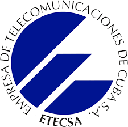Executive Secretary

21st International Symposium on Electrical Engineering
SIE 2025
Abstract
The growing prominence of renewable sources in the energy matrix has introduced new challenges for the dynamic control of solar inverters in smart electrical grids, particularly in the face of demand and generation variability. This issue impacts energy efficiency, grid stability, and the quality of the injected power.
This study aimed to develop and implement a control algorithm based on Deep Reinforcement Learning (DRL) to optimize the behavior of solar inverters in response to grid demand fluctuations.
The methodology involved designing a simulation environment based on realistic electrical models, within which a DRL agent was trained to adapt the inverter's operating point in real time. The agent’s performance was evaluated under various load and generation scenarios and compared with traditional control methods.
Results showed that the DRL algorithm significantly reduced energy losses, improved generation-consumption matching, and maintained power quality parameters within standard limits. Additionally, the system demonstrated better adaptability to unforeseen events, although challenges related to scalability and robustness were identified.
It is concluded that the use of DRL represents a promising tool for the advanced control of solar inverters, with potential for deployment in smart grid architectures. Future research should focus on its validation in physical environments and integration with multi-agent systems.
Resumen
El creciente protagonismo de las fuentes renovables en la matriz energética ha planteado nuevos desafíos para el control dinámico de inversores solares en redes eléctricas inteligentes, especialmente ante la variabilidad de la demanda y la generación. Esta problemática afecta la eficiencia energética, la estabilidad de la red y la calidad de la energía inyectada.
El presente estudio tuvo como objetivo desarrollar e implementar un algoritmo de control basado en Aprendizaje por Refuerzo Profundo (DRL, por sus siglas en inglés) para optimizar el comportamiento de inversores solares frente a variaciones en la demanda de la red.
La metodología consistió en diseñar un entorno de simulación basado en modelos eléctricos realistas, sobre el cual se entrenó un agente DRL capaz de adaptar en tiempo real el punto de operación del inversor. Se evaluó el desempeño del agente frente a distintas condiciones de carga y generación, comparándolo con métodos de control tradicionales.
Los resultados mostraron que el algoritmo DRL logró reducir significativamente las pérdidas energéticas, mejorar la correspondencia generación-consumo y mantener los parámetros de calidad de energía dentro de los estándares. Se identificó además una mejor capacidad de adaptación ante eventos imprevistos, aunque se reconocen desafíos en términos de escalabilidad y robustez.
Se concluye que el uso de DRL constituye una herramienta prometedora para el control avanzado de inversores solares, con potencial de implementación en arquitecturas de redes inteligentes. Futuras investigaciones deberán enfocarse en su validación en entornos físicos y su integración con sistemas multi-agente
About The Speaker

Guillorki Romero

Discussion


 Bronze
Bronze